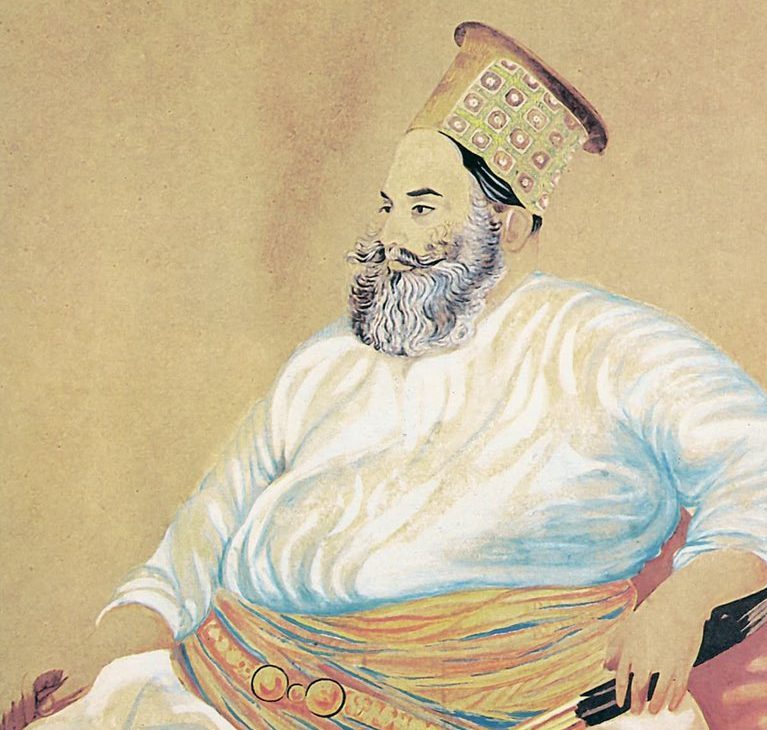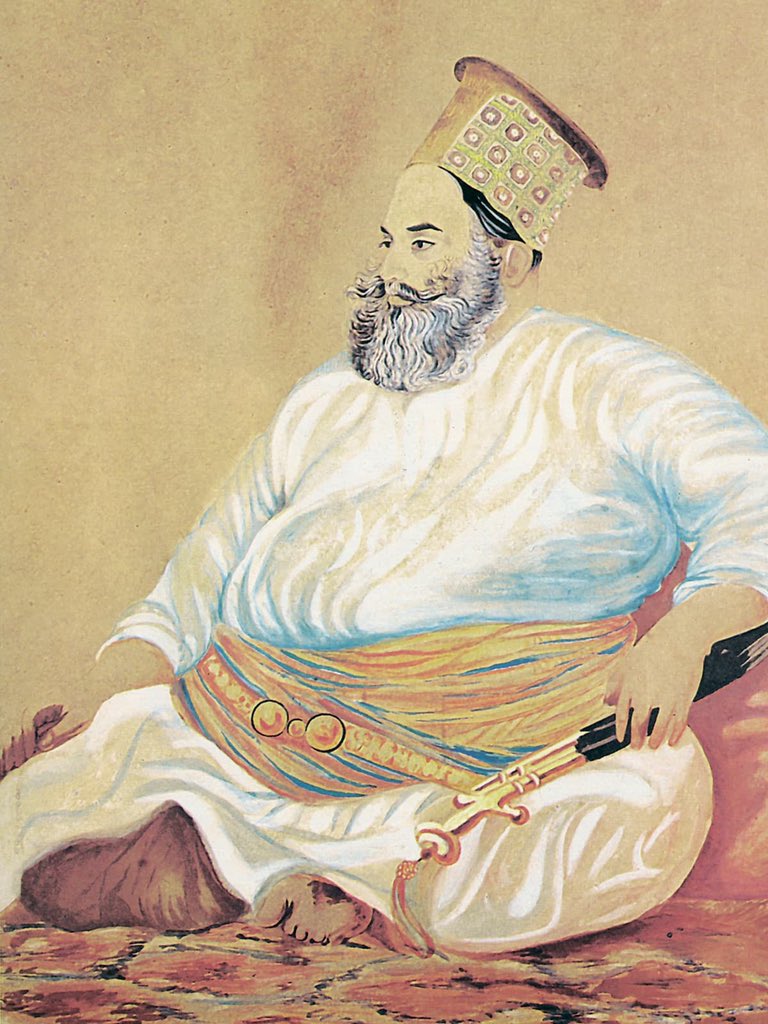
On Feb. 17, 1843, the battle of Miani Mir Naseer Khan’s forces were defeated by British and the next day, along with other Ameers, he was arrested and exiled to Calcutta, where during confinement and exile, he breathed his last on 24 April, 1845 due to sudden heart attack.
Muhammad Habib Sanai
A few weeks ago, renowned writer and researcher Mirza Kazim Reza Beg sahib gifted me a precious copy of Diwan Jaffery Urdu written by Mir Mohammad Naseer Khan Talpur, who was the last king of the Talpur dynasty when Sindh was occupied by the British in 1843.
It is a very strange fact that three contemporary rulers, M/s Bahadar Shah Zafar, Wajid Ali Akhtar of Awadh, and our Mir Mohammad Naseer Khan Talpur were poets, the last rulers of their dynasties, and also were imprisoned and exiled and spent their last days in the captivity.
Mir Naseer Muhammad Khan Talpur was born on 17th May 1802/14 Muhram al Haram 1217 AH in Hyderabad and after the death of his elder brother, he was enthroned as the ruler of Sindh on 24 December, 1839/ 17 Shawal al Mukram, 1255 AH. After a few years, in the battle of Miani fought on 17 February, 1843, his forces were defeated by British forces and on 18th February, 1843, along with other Ameers, he was arrested and exiled to Calcutta. During that imprisonment and exile, he breathed his last on 24 April, 1845 / 6 Rabi II, 1261 AD on account of a sudden heart attack.
At a very young age, Mir Naseer Khan started composing poetry in Persian and his Nom de plume was Jaffery. His first Persian poetry collection entitled Diwan e Qasaaed Jaffery, was written in 1815 /1230 AH, and according to Mirza Abbas Ali Baig Abbas, who has compiled his Urdu Diwan, it contains the poems in praise of the Holy Prophet PBUH and his progeny. His second poetry anthology of Persian ghazals entitled Diwan Jaffery was written in 1818/1233 AH. Masnavi Mirza Sahiban is his third Persian work, wherein the romantic tale of Punjab known as Mirza Sahibaan is narrated in 1224 baits written during 1820/1235 AH. Masnavi Mukhtarnama is his fourth poetry collection written in 1826 /1242 AH. It recounts the life and achievements of Hazrat Mukhtiar Saqfi RA. This Masnavi is spread over 20500 couplets. During his detention in Calcutta, he also composed poetry in Urdu. His Urdu poetry anthology entitled as Diwan Jaffery was composed in 1844/1260. During the said captivity, he also composed Masnavi Safarnama Jaffery in 1844/1260, wherein he has enumerated hardships, persecutions, and problems faced during incarceration. According to Mirza Abass Ali Baig Abbas, this jail diary is very painful and pursoz.
 Dr. James Burnes, who was Surgeon to the residency of Bhooj, visited Talpur court in the year 1827 for treatment of then-ailing ruler of Sindh. He wrote an account of his visit which was published as a book entitled ‘A narrative of a Visit to the Court of Sinde’. During that visit, he also met Mir Mohammad Naseer Khan Talpur and what he wrote about him in his book is reproduced here:
Dr. James Burnes, who was Surgeon to the residency of Bhooj, visited Talpur court in the year 1827 for treatment of then-ailing ruler of Sindh. He wrote an account of his visit which was published as a book entitled ‘A narrative of a Visit to the Court of Sinde’. During that visit, he also met Mir Mohammad Naseer Khan Talpur and what he wrote about him in his book is reproduced here:
“Meer Mahommed Nusseer Khan is the second son of Mourad Ali, and is by far the most engaging and popular of the reigning family in Sinde. He is twenty-five years of age, of handsome figure though rather corpulent, with much dignity of manners, and a noble expression of countenance, undisfigured by the least resemblance to his father or brother. The dissimilarity, fortunately, is as complete in character as in personal appearance.
Nusseer Khan is as generous as they are sordid, and has lavished the treasures which were allotted him with profuse liberality; a quality which, whether a virtue or a vice, has ever been known to receive general praise and approbation, particularly in Asiatic countries.
During my march to Hyderabad, his Highness’s virtues and poetical genius formed the theme of constant commendation; and, presuming that the vanity of authors was much the same in all parts of the world, I took an opportunity, on my first visit, to request, as a particular favor, that he would honor me with a copy of his works, entitled the Dewan Jaffieri, the fame of which, I added, had extended all over India. This compliment was most graciously received; and a few days after he presented to me a beautifully illuminated copy of them, with an inscription on the title page written by himself. If they are really his own composition, they do him infinite credit; but I must confess that his conversation never exhibited any proofs of an exalted imagination.
The present of the Dewan Jaffieri was followed by gifts of a superior description from the other Ameers; who, although they could not compliment me with book written by themselves, begged my acceptance of elegant editions of the Poems of Haflz and Sadi, some of which had had a place for many generations in the library of the Caloras, and, in addition to their real value, were beautiful specimens of Persian penmanship. ….
Nusseer Khan has ever expressed a favorable feeling towards the British government. He has been unremitting in his civilities to our native agent at Hyderabad; and, during my residence there, he was even more attentive to me than the others. He is the darling of the soldiery, from excelling in all manly exercises, and the most likely of the younger branches of the family to attain that pre-eminence which someone or other will probably in the end acquire. He does not appear a very determined or aspiring character; but it is impossible to foretell how his disposition may be influenced by a fair field for his ambition, particularly as the stream of public opinion is so decidedly in his favor.”
His Urdu Diwan was compiled by Mirza Abbas Ali Beg Abbas in 1981, but it has been printed by Hasan Talpur Academy in 2021 after a lapse of 40 years.
According to Safdar Abbas Mirza Saifee, who is the Technical Editor of this edition, the poetry of Mir Naseer consists of simple words and easy formats.
____________________
Muhammad Habib Sanai is based in Hala town of Sindh